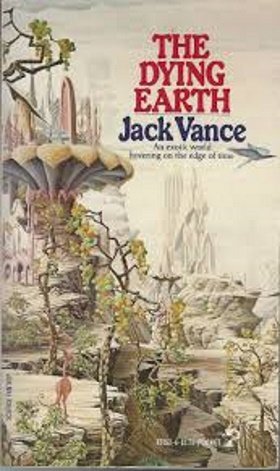The older man said under his hand, “Hold your tongue; speak no word. He will curse the tones of your voice …”
“You are wrong, I assure you,” replied Ulan Dhor politely. “Have either of you ever seen a demon?”
“None but the Gauns.”
“Do I resemble the Gauns?”
“Not at all,” admitted the older man. His companion indicated Ulan Dhor’s dull scarlet coat and green trousers. “He is evidently a Raider; note the color of his garb.”
Ulan Dhor said, “No, I am neither Raider nor demon. I am merely a man …”
“No men exist except the Greens — so says Pansiu.”
Ulan Dhor threw back his head and laughed. “Earth is but wilderness and ruins, true enough, but many men yet walk abroad … Tell me, is the city Ampridatvir to be found on that island ahead?”
The younger man nodded.
“And you live there?”
Again the young man assented.
Ulan Dhor said uncomfortably, “I understood that Ampridatvir was a deserted ruin — forlorn, desolate.”
The young man asked with a shrewd expression, “And what do you seek at Ampridatvir?”
Ulan Dhor thought, I will mention the tablets and observe their reaction. It is well to learn if these tablets are known, and if so, how they are regarded. He said, “I have sailed three weeks to find Ampridatvir and investigate some legendary tablets …”
“Ah,” said the older man. “The tablets! He is a Raider, then. I see it clearly. Note his green trousers. A Raider for the Greens …”
Ulan Dhor, expecting hostility as a result of this identification, was surprised to find a more pleasant expression on the faces of the men, as if now they had resolved a troublesome paradox. Very well, he thought, if that is how they will have it, let it be.
The younger man wished total clarity. “Is that your claim then, dark man? Do you wear red as a Raider for the Greens?”
Ulan Dhor said cautiously, “My plans are not settled.”
“But you wear red! That is the color the Raiders wear!”
Here is a peculiarly disrupted way of thinking, reflected Ulan Dhor. It is almost as if a rock blocked the stream of their thought and diverted the current in a splash and a spray. He said, “Where I come from, a man wears such colors as he chooses.”
The older man said eagerly, “But you wear Green, so evidently you have chosen to raid for the Greens.”
Ulan Dhor shrugged, sensing the block across a mental channel. “If you wish … What others are there?”
“None, no other,” replied the older man. “We are the Greens of Ampridatvir.”
“Then — whom does a Raider raid?”
The younger man moved uneasily and pulled in his line. “He raids a ruined temple to the demon Cazdal, for the lost tablet of Rogol Domedonfors.”
“In that case,” said Ulan Dhor, “I might become a Raider.”
“For the Greens,” said the old man, peering at him sidewise.
“Enough, enough,” said the other. “The sun is past the zenith. We had best be homeward.”
“Aye, aye,” said the older man, with sudden energy. “The sun drops.”
The younger man looked at Ulan Dhor. “If you propose to raid, you had best come with us.”
Ulan Dhor passed a line to the barge, adding his fabric sail to the plaited reeds, and they turned their bows toward shore.
It was very beautiful, crossing the sunny afternoon swells toward the forested island, and as they rounded the eastern cape, Ampridatvir came into view.
A line of low buildings faced the harbor, and beyond rose such towers as Ulan Dhor had never imagined to exist — metal spires soaring past the central height of the island to glisten in the light of the setting sun. Such cities were legends of the past, dreams of the time when the Earth was young.
Ulan Dhor stared speculatively at the barge, at the coarse green cloaks of the fishermen. Were they peasants? Would he become a butt for ridicule, thus arriving at the glistening city? He turned uncomfortably back to the island, chewing his lips. According to Kandive, Ampridatvir would be toppled columns and rubble, like the Old Town above Kaiin …
The sun dropped against the water, and now Ulan Dhor, with a sudden shock, noticed the crumble at the base of the towers; here was his expectation, as much desolation as Kandive had predicted. Strangely the fact gave Ampridatvir an added majesty, the dignity of a lost monument.
The wind had slackened, the progress of boat and barge was slow indeed. The fishermen betrayed anxiety, muttering to each other, adjusting their sail to draw its best, tightening their stays. But before they drifted inside the breakwater, purple twilight had dropped across the city, and the towers became tremendous black monoliths. In near-darkness they tied to a landing of logs, among other barges, some painted green, others gray.
Ulan Dhor jumped up to the dock. “A moment,” said the younger fisherman, eyeing Ulan Dhor’s red coat. “It would be unwise to dress thus, even at night.” He rummaged through a box and brought forth a green cape, ragged and smelling of fish. “Wear this, and hold the hood over your black hair …”
Ulan Dhor obeyed with a private grimace of distaste. He asked, “Where may I sup and bed tonight? Are there inns or hostels in Ampridatvir?”
The younger man said without enthusiasm, “You may pass the night at my hall.”
The fishermen slung the day’s catch over their shoulders, climbed to the dock, and peered anxiously through the rubble.

























